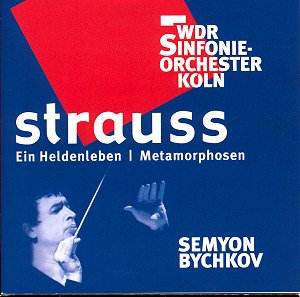The enterprising Avie label continues to get the big
names on board. Hot on the heels of Jose Cura’s Rachmaninov Second
Symphony comes this excellent release. I had begun to wonder what
had happened to Semyon Bychkov’s recording career; I still play his
debut disc, a subtle, thoughtful and beautifully characterised account
of Shostakovich 5 with the Berlin Philharmonic, released on Philips
in the late 1980s. The booklet note tells us he has been active in the
recording studio as well as the concert hall and opera house, but in
truth his discography is relatively small for someone who seemed to
have a glittering future. Maybe this disc of mainstream favourites will
do the trick.
Of course, this disc is entering a very crowded field,
and both pieces have been well served on record since the earliest days.
There are numerous recommendable versions, but the coupling is rare,
and it makes excellent sense, the swaggering confidence of Heldenleben
contrasting most movingly with Metamorphosen, that disillusioned,
elegiac outpouring of his final phase. This is something Bychkov clearly
understands, and the disc is best heard straight through as a programme.
I played it four times on the trot, and can only say that I admired
the playing and conducting more with each hearing.
Bychkov’s intelligent musical mind is at work from
the start, and he makes the listener see (or hear) the bigger picture,
refusing to play to the gallery or give us odd moments in ‘technicolour’,
of which some versions are guilty. That’s not to say there isn’t excitement
aplenty, but it is cumulative, and therefore more effective. The gloriously
broad opening melody, which sets the tone for the whole piece, is paced
to perfection, its contours and shaping underpinned by exquisite phrasing
and dynamics. The music swells and relaxes, really breathes, and the
strings are encouraged by their conductor to give and take as one, almost
like a chamber ensemble. The critics carp beautifully in section 2,
and I doubt if there could be more characterful or sweet-toned solo
violin playing than Kyoko Shikata’s in section 3, ‘The Hero’s Companion’,
an affectionate but waspish representation of the composer’s wife, Pauline.
Shikata covers the gamut of emotion, and Bychkov follows her at every
turn – he must be a wonderful concerto partner. ‘The Hero’s Deeds in
Battle’ (section 4) may at first strike one as under powered, until
you realise that other versions are overdoing the drums at the start
(usually helped by false highlighting in the recording). Bychkov is
exciting, but is looking forward symphonically, and when the opening
theme is recapitulated (track 4, 6’20) we know just where he was heading.
As mentioned above, he integrates everything, so when we get the big
Don Juan horn theme quoted (track 5, 1’05) it is a telling episode
of recollection in our hero’s life, rather than a cute bit of showing
off. The end is truly moving, and never in this performance did I feel
(as I have done with others) that the composer is wearing his heart
on his sleeve.
The last section of Heldenleben is titled ‘The
Hero’s retirement from the world and the fulfilment of his life’, and
though we know it to be a self-portrait, listening to the opening of
Metamorphosen immediately after tells the true story. Bychkov’s
line of thought is the same as Heldenleben, and no less effective.
This is a ‘ lament without end … a choral lament without human voices,
only melody …’as the booklet has it, poetic but true, certainly in this
performance. It is a tricky work to really bring off, and this is the
best account I have heard since Rattle’s Vienna version, one of the
best reasons for buying his Mahler 9 (EMI). The strings of the WDR orchestra
do indeed become Strauss’s beloved voices, and they sing with such passion
and commitment that the spell cannot be broken until it has to be, at
the very end, when we get the famous quote from that other great lament,
Beethoven’s Eroica. It is a draining but memorably moving experience,
a half-hour journey that encapsulates the tragedy of a nation and its
culture, and how appropriate that is at the moment!
The playing of the WDR orchestra definitely contributes
to the enjoyment of the whole. Without their commitment (or indeed ability),
Bychkov’s vision would be severely diluted. As many of us know from
Rudolf Barshai’s stunning Shostakovich cycle, this is an orchestra to
be reckoned with, and Bychkov, who has been in charge since 1997, has
shown what a superb technician, trainer and all round inspiration he
can be. The string tone lacks nothing in comparison to Rattle’s VPO,
and the Heldenleben playing certainly outshines the sometimes
scrappy offering from Ashkenazy’s Cleveland forces on Decca. The recording
quality is superb, fully capturing the now famous acoustics in Cologne.
There is so much more to enjoy here than many of the
high profile, virtuoso run-throughs we have had to get used to. It is
deeply felt playing, guided by a conductor whose searing musical vision
and love of the pieces shines through every phrase. Even if you have
other versions of these glorious works (as any Straussian will have),
you will not regret getting this one.
Tony Haywood

![]() for details
for details